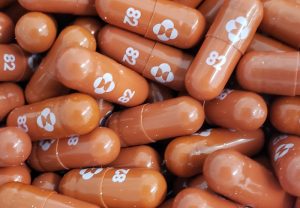Experimental COVID-19 Pill and Its Potential Effects
Elizabeth Rauchet
US News Writer
The pharmaceutical firm Merck declared last week that an antiviral pill it’s creating can significantly decrease numbers of hospitalizations and deaths among individuals with Coronavirus. The outcomes haven’t yet been thoroughly analyzed, though. If the drug candidate, molnupiravir, is approved by medical regulators, it would be the first oral antiviral treatment for Coronavirus. Right now, there’s only another option: approved medications are injected.
A pill could make treating patients before their infection a lot more straightforward — and more successful. Likewise, it could hold emergency clinics back from being overcrowded, particularly in places where immunization rates are still low, like some low-and middle-income nations. Molnupiravir was so viable in a stage 3 testing involving people with COVID who are at risk of serious illness that clinicians stopped enrolment early.

However, whether this clinical-preliminary example of overcoming adversity will convert into a distinct worldwide advantage in the battle against the pandemic isn’t yet clear. Moreover, regardless of whether lower-income nations can manage the cost of the medication, they probably won’t have the analytic ability to treat patients with molnupiravir from the get-go throughout their disease, when treatment could have an effect.
This week, two Indian drugmakers independently testing nonexclusive molnupiravir in individuals with moderate symptoms because Coronavirus tried to end their trials since they saw no “critical adequacy” for the test drug, even though they intend to proceed with preliminaries for individuals with mild sickness. Merck’s discoveries, which were uncovered in a public statement and still can’t seem to be revealed by researchers and submitted to regulators for endorsement, applied to individuals with mild to-direct instances of Coronavirus who were not hospitalized. A representative for Merck calls attention to that moderate Coronavirus cases in India are more severe than in the US and include hospitalization.
Other treatments on offer against Coronavirus, Gilead Science’s antiviral remdesivirand a monoclonal immunizer mixed drink from biotech firm Regeneron, should be controlled intravenously or by injection. Unfortunately, that makes it hard for individuals to get to the treatments before they are sick enough for emergency clinics. Also, remdesivir is reinforced distinctly for the individuals who are as of now hospitalized with Coronavirus.
However, it’s wiser to “hit early, hit hard” with antivirals, says Richard Plemper, a virologist at Georgia State College in Atlanta. The more weakened the patient, the less successful the medications are at treating the disease. A Coronavirus pill, which basically requires a solution and an outing to the drug store once signals show up, would make early treatment more straightforward.
Contact Elizabeth at elizabeth.rauchet@student.shu.edu

